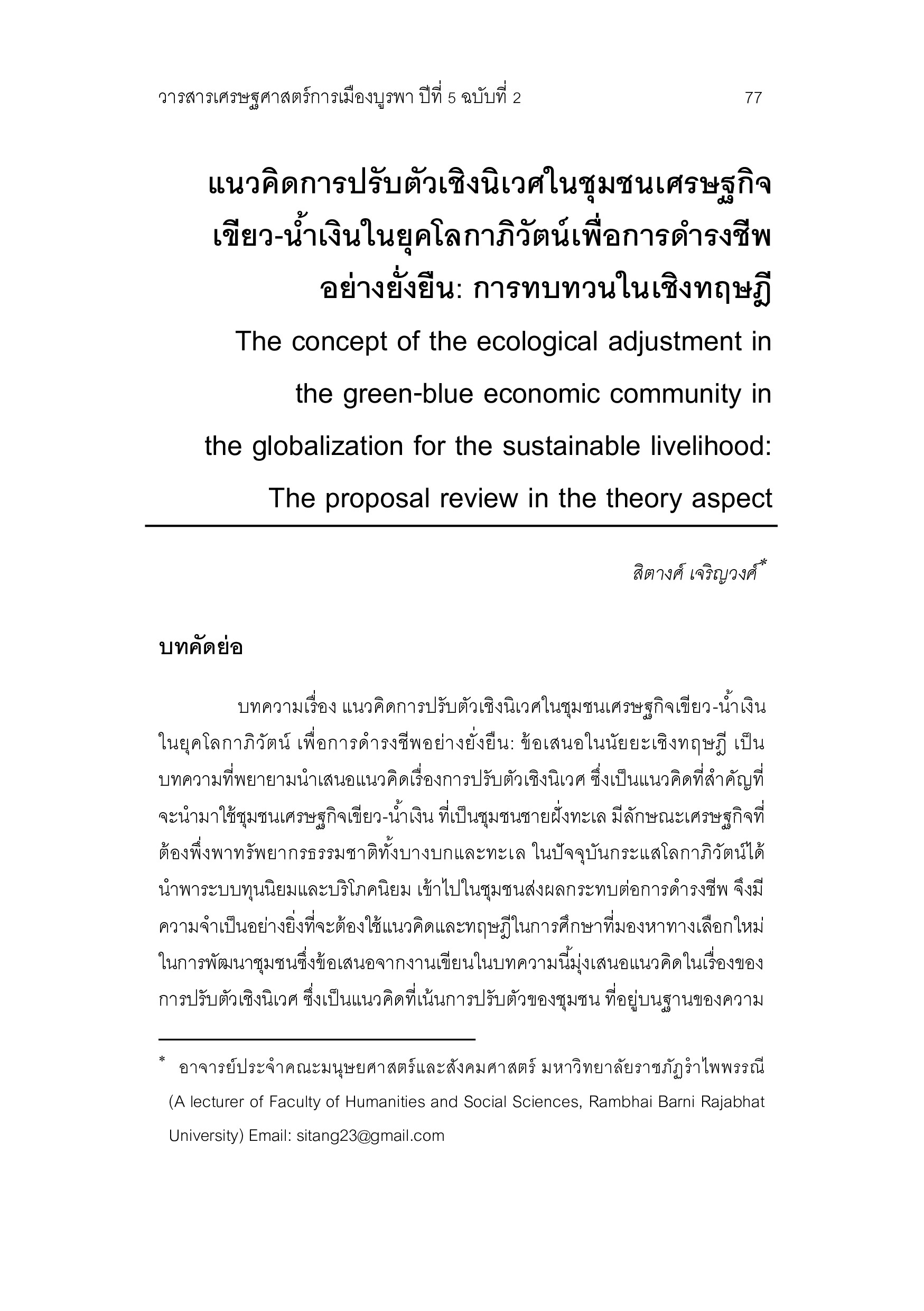The Concept of the Ecological Adjustment in the Green-Blue Economic Community in the Globalization for the Sustainable Livelihood: The Proposal Review in the Theory Aspect
Keywords:
: The Green-Blue Economic Community, Globalization, Ecological AdjustmentAbstract
The concept of the ecological adjustment in the green-blue economic community in the globalization for the sustainable livelihood: The proposal in the theory is the article that attempt to propose the ecological adjustment concept to use in the green-blue economic community where is the coastal community with the economic figure depending on the natural resources of both land and sea. The tide of globalization brings capitalism and consumerism to the community which effects to local livelihood. It is essential to use the concept and theory to studying new alternative way for community developing. This research focuses on the proposal of the of the ecological adjustment concept applying to the community adaptation base on the environmental concern by emphasizing the bottom works, management by the community standing on the grassroots democracy, and blend of the principle for nature sustainability. The proposition of community study upon the concept of the ecological adjustment in the green-blue economic community in the globalization for the sustainable livelihood is to search the data relevant to the economic and ecology systems of the green-blue economic in the community level, synthesis the economic and ecological problems effected to the community together with their problem-solving processes, look at political aspect in the grassroots level which impacts to the problem-solving processes, analyze local culture and local culture and the local wisdom relating to people’s way of life at the present, assess to the community management system as to correct the community economic issue, and present a guideline of the green-blue economic community adaptation plan to achieve the sustainable career.
References
เอกสารภาษาไทย
กุลวดี แก่นสันติสุขมงคล. (2555). กลไกการขับเคลื่อนการปรับตัวของชุมชนต่อการเปลี่ยนแปลงสภาพภูมิอากาศ : กรณีศึกษาเปรียบเทียบเครือข่ายลุ่มน้ำปะเหลียน จังหวัดตรัง และเครือข่ายลุ่มน้ำประแส จังหวัดระยอง. กรุงเทพฯ: สำนักงานกองทุนสนับสนุนการวิจัย.
คณะบริหารศาสตร์ มหาวิทยาลัยอุบลราชธานี. (2550). โครงการวิจัยประเมินผลโครงการแก้ไขปัญหาหนี้สินภาคประชาชนกลุ่มหนี้นอกระบบธนาคารเพื่อการเกษตรและสหกรณ์การเกษตร (ธกส.). อุบลราชธานี: มหาวิทยาลัยอุบลราชธานี.
ชัยยนต์ ประดิษฐศิลป์. (2559). เอกสารประกอบการสอนวิชา ปฏิบัติการวิจัยทางสังคม. จันทบุรี: คณะมนุษยศาสตร์และสังคมศาสตร์ มหาวิทยาลัยราชภัฎรำไพรรณี .
ประภาส ปิ่นตบแต่ง. (2558). การเปลี่ยนแปลงด้านเศรษฐกิจการเมืองในชุมชนชนบทและการปรับตัวของชาวนา. ใน เอกสารประกอบการประชุมวิชาการระดับชาติ เนื่องในวันคล้ายสถาปนาครบรอบ 49 ปี สถาบันพัฒนบริหารศาสตร์ ประจำปี 2558. กรุงเทพฯ: คณะพัฒนาสังคมและสิ่งแวดล้อม สถาบันบัณฑิตพัฒนบริหารศาสตร์.
ปรีชา เปี่ยมพงศ์สานต์. (2543ก). นิเวศเศรษฐศาสตร์และนิเวศวิทยาการเมือง. กรุงเทพฯ: จุฬาลงกรณ์มหาวิทยาลัย
_______. (2543ข). สิ่งแวดล้อมกับการพัฒนา. กรุงเทพฯ: จุฬาลงกรณ์มหาวิทยาลัย.
_______. (2557). เศรษฐศาสตร์การเมืองและทฤษฎีสังคมวิพากษ์. ขอนแก่น: มหาวิทยาลัยขอนแก่น.
_______. (2558). สหวิทยาการเพื่อความยั่งยืนทางนิเวศและความยุติธรรมทางสังคม. ใน เอกสารประกอบการสัมมนาเผยแพร่แนวคิดหลักสูตรสหวิทยาการ วันศุกร์ที่ 24 เมษายน 2558 ณ หอประชุมมหาวทยาลัยราชภัฏรำไพพรรณี.
ปรีชา เปี่ยมพงศ์สานต์ และคณะ. (2556). เศรษฐกิจสีเขียวของชุมชนภายใต้การเปลี่ยนแปลงสภาพภูมิอากาศ: กรณีศึกษาชุมชนในพื้นที่ภาคตะวันออก. กรุงเทพฯ: สำนักงานสนับสนุนการวิจัย.
ปรีชา เปี่ยมพงศ์สานต์ และชัยณรงค์ เครือนวน. (2558). เศรษฐกิจสีเขียวในชุมชนท้องถิ่นไทย: ศึกษาชุมชนท้องถิ่นแห่งหนึ่งในภาคตะวันออก. วารสารเศรษฐศาสตร์การเมืองบูรพา, 3 (2): 85-102.
เรืองวิทย์ ลิ่มปนาท. (2546). ประวัติศาสตร์เศรษฐกิจชายฝั่งทะเลตะวันออกก่อน พ.ศ. 2525. ชลบุรี: มหาวิทยาลัยบูรพา.
โอฬาร ถิ่นบางเตียว. (2559). จังหวัดระยอง: จากเศรษฐกิจชุมชนถึงทุนนิยมโลกาภิวัตน์. วารสารเศรษฐศาสตร์การเมืองบูรพา, 2 (1): 47-71.
เอกสารภาษาต่างประเทศ
Reid, H. & et al. (eds.). (2013). Community based adaptation: Mainstreaming CBA into national and local planning. In Conference proceedings: 7th international conference, Dhaka, Bangladesh. London: IIED/BCAS.






